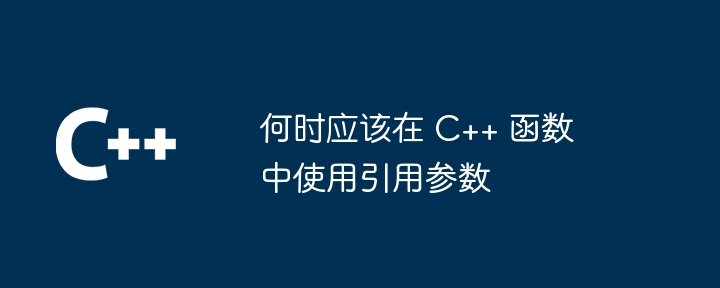Home >Backend Development >C++ >When should you use reference parameters in C++ functions
When should you use reference parameters in C++ functions
- PHPzOriginal
- 2024-04-19 18:54:01402browse
When to use reference parameters in C functions? The function needs to modify parameters. Functions operate on large objects and are expensive to copy. Function semantics require that parameters be updated. External functions need to access and modify internal variables.

When to use reference parameters in C functions
Introduction
In In C, function parameters can be passed by value or by reference. When using reference parameters, the function modifies the parameter passed, whereas passing by value creates a copy of the parameter. It is crucial to know when to use reference parameters in functions because it affects the efficiency and safety of your program.
Benefits of using reference parameters
- Efficiency: Avoid creating copies of parameters, thereby improving efficiency.
- Modification ability: Allows the function to modify the passed parameters, which is very useful in certain situations, such as updating data structures.
- Clear semantics: In some cases, using reference parameters can make the semantics of a function clearer.
When to use reference parameters
In general, you should consider using reference parameters in the following situations:
- Function Parameters need to be modified.
- This function will operate on large objects, and copying them will be expensive.
- The semantics of the function require that the parameters be updated.
- External functions need to access and modify internal variables.
Practical case
Consider the following function that exchanges two integers:
void swap(int a, int b) {
int temp = a;
a = b;
b = temp;
}Since we cannot modify the passed value parameter, this Function cannot exchange values. To solve this problem, we can use reference parameters:
void swap(int &a, int &b) {
int temp = a;
a = b;
b = temp;
}Now the function can directly modify the passed parameters, thus correctly exchanging the values.
Notes
You need to pay attention to the following points when using reference parameters:
- Avoid dangling references: Always ensure that the value passed to the reference parameter Variables are valid during function execution.
- Avoid modifying constants: Reference parameters cannot be used to modify variables that have been declared const.
- Track ownership: Make sure it's clear who is responsible for destroying objects passed to reference parameters.
The above is the detailed content of When should you use reference parameters in C++ functions. For more information, please follow other related articles on the PHP Chinese website!

